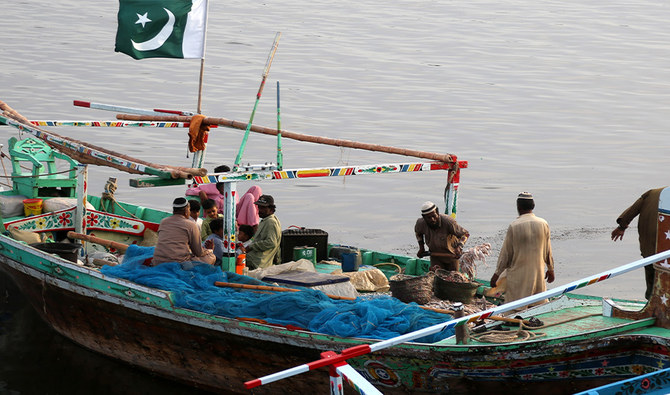KARACHI: With a forlorn expression on his face, 35-year-old Aijaz Abbasi anxiously waits for his wife to return to their small, rented house so she can cook a meal for him and their two children. Life was much easier for him when he used to fish for a living in a small town some 150 kilometers away from Pakistan’s southern port city of Karachi, but the climate-induced coastal floods forced the family to flee to a safer area four months ago.
There’s just one problem here though: there aren’t plenty of fish in the sea due to the effects of climate change and ruthless trawling.
Hundreds of families like Abbasi’s face a similar conundrum after migrating to the coastal town of Rehri Goth from Keti Bandar, some 153.8 kilometers from Karachi, as well as from seaside villages in Thatta, Badin and Sujawal districts over the past couple of years.
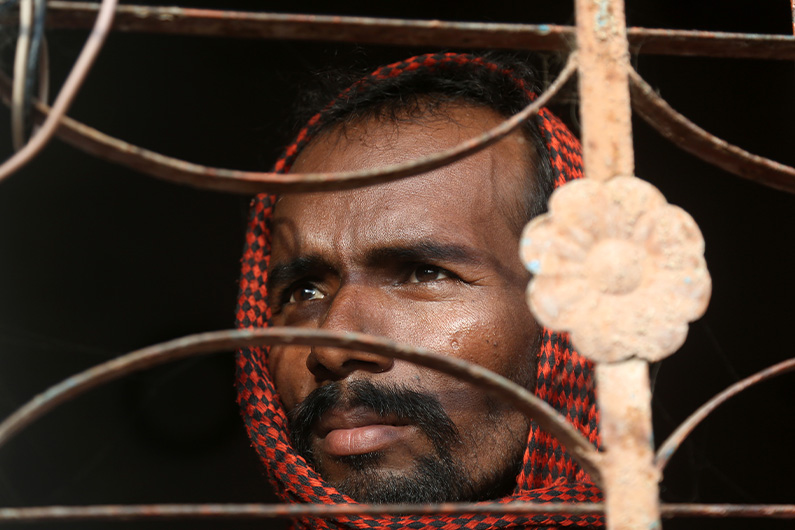
Aijaz Abbasi, 35, waits for his wife Hameeda to return from the factory to cook a meal for her ailing husband and two children at their home in Rehri Goth, Karachi, September 2, 2022. (AN Photo/S.A. Babar)
With rent to pay each month, scarce resources and a mounting electricity bill, the trauma proved too much for Abbasi to handle.
“I would go fishing in my hometown. But then, the rising sea level and floods forced us to leave our homes,” Abbasi told Arab News.
“I went fishing but experienced a stroke as I was struggling to earn here due to a decline in fishing.”
His wife, Hameeda, makes a meagre Rs15,000 ($65.66) per month from her job at a garment factory. Of that, the family only has Rs5,000 ($21.89) left for this month.
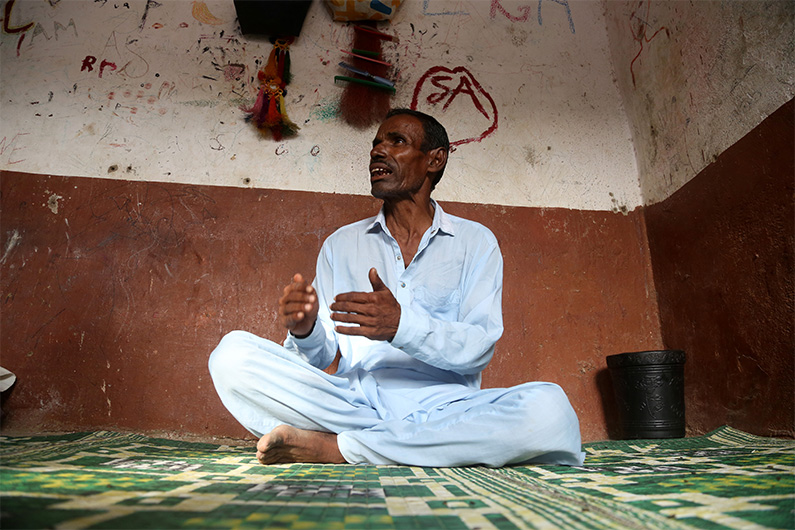
Abdul Latif Abbasi sits in a one-room space in Rehri Goth, Karachi, September 2, 2022. After seawater submerged his ancestral home in Keti Bandar, he was forced to leave for Rerhi Goth nine months ago (AN Photo/S.A. Babar)
Next door, 55-year-old Abdul Latif Abbasi faces a similar problem. For nearly a century, his family would catch fish to live a modest life in Keti Bandar. Nine months ago, rising seawater submerged Latif’s ancestral home, forcing him to move to Rehri Goth.
He too complained that there wasn’t much catch in the area compared to his hometown. Latif has hardly gone fishing in the 270 days he has stayed in Rehri Goth.
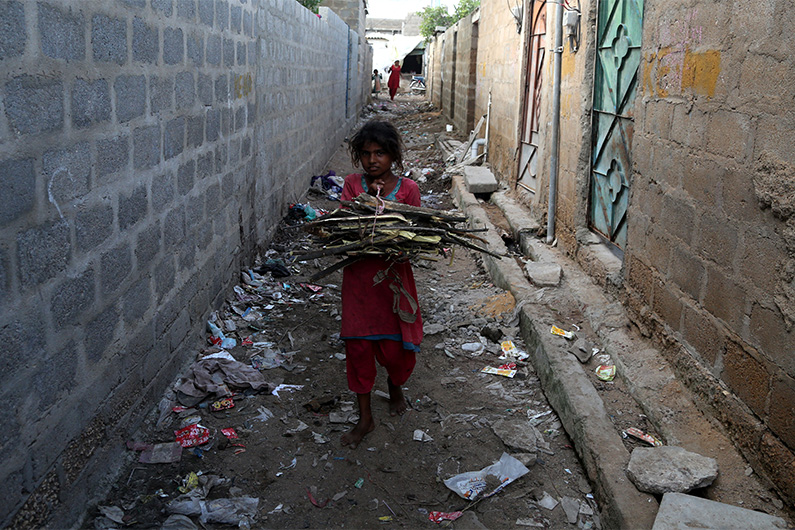
A young girl walks through a narrow street in Rehri Goth, a coastal village in Pakistan’s port city, carrying a stack of wooden sticks, September 2, 2022 (AN Photo/S.A. Babar)
“Life was great there, we would earn, eat and enjoy our time,” Latif told Arab News, “Here if we have food to eat for one time, the next [time] we starve.”
Coastal flooding is a huge threat to the livelihood of these communities across the country. To make both ends meet, Latif’s wife Jamila and daughter Iram work at a factory in the nearby Qur’angi industrial zone to earn a combined sum of Rs20,000 ($87.68) a month.
Latif, his wife and their five children live in a small rented space that includes a room, a kitchen and a bathroom that costs them Rs5,000 ($21.92). Additionally, the family has to pay for electricity charges and for two meals a day.
Latif’s youngest daughter Kiran, 15, works in the shabby kitchen and takes care of the household chores, while her mother and elder sister work at the factory.
Kiran spends most part of her day here, washing utensils and making rotis (round flatbread) for the family. It is like her own little space in the house.
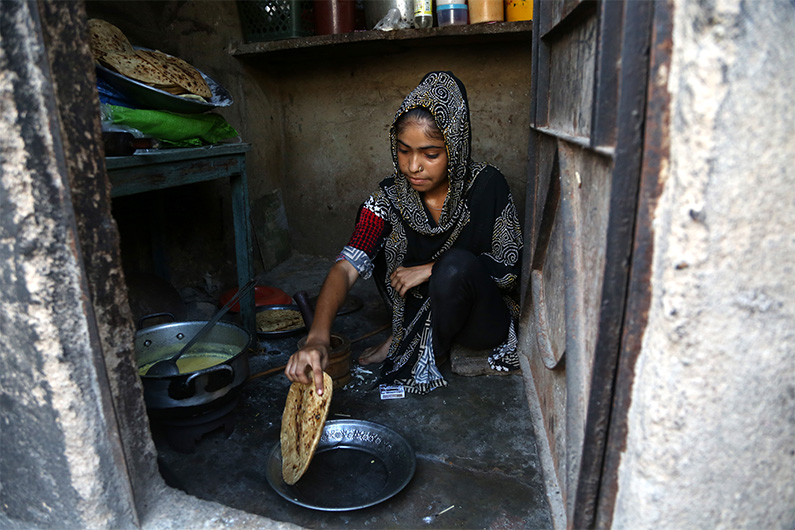
Kiran, 15, makes rotis for the family while her mother and sister toil at the factory during the day. She stays at home in Rehri Goth, Karachi, September 2, 2022 (AN Photo/S.A. Babar)
“I couldn’t continue my studies after we moved out from Keti Bandar due to financial reasons,” she told Arab News. “I used to attend school and madressah there with friends; I didn’t want to move out but my parents asked for it.”
Situated on a dune with a high-tension power transmission line passing overhead, this littered Khaskheli Mohala neighborhood houses families who have lost almost everything to the disastrous impact of climate change. Wandering through these narrow, congested streets, one can spot children playing in the dirt.
A poor drainage system ensures living spaces in the area are not clean and results in accumulation of contaminated water in the neighborhood.
A lot of migration has taken place to Rerhi Goth and Ibrahim Hyderi, another fishing village in Karachi, with people arriving from Thatta, Badin and Sajawal districts. But these districts do not offer enough employment opportunities.
Over 150 families migrated to Rehri Goth from Keti Bandar and nearby localities in the last couple of years, according to local activist Nawaz Dablo.

Boats stand at the sea, awaiting the right time for the catch in Ibrahim Hyderi, a fishing village in the Karachi’s Korangi District, September 2, 2022. (AN Photo/S.A. Babar)
Of them, around 70 families moved over the last few months after the recent floods. Since Ibrahim Hyderi cannot accommodate more people, those arriving are instead settling in Rehri Goth and adjacent neighborhoods. There is ample water, electricity and gas available for them here.
“Fishermen and farmers become a major target of climate change,” Abdul Majeed Motani, leader of the Pakistan Fisherfolk Forum (PFF), told Arab News.
“Earlier, August 15 onwards, it used to be a good season for fishing for three months straight. It used to be smooth and [fish were found] in good quantity throughout this period. However, for the last three-four years, September remains cold and rainy which has severely affected the catch.”
He said residents of coastal areas were struggling to make ends meet, given their lack of income due to rising inflation and increasing expenses. Even though authorities talk about generating environment-friendly energy, Motani said no measures had been taken in this regard.
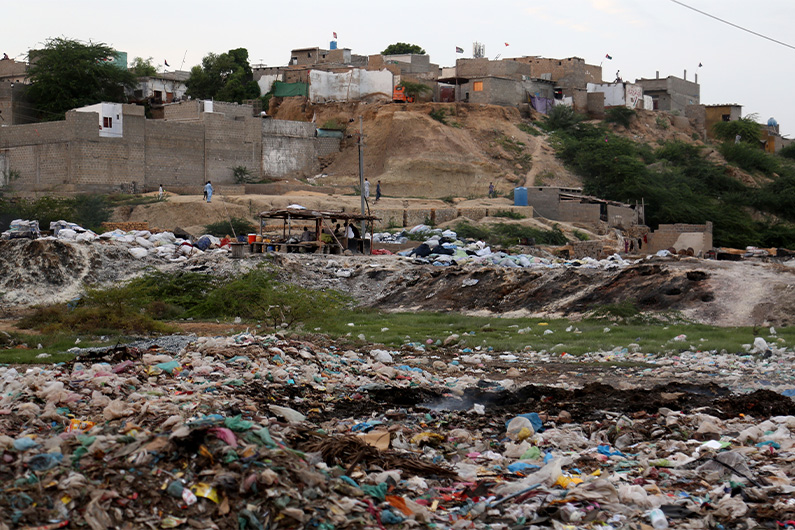
Residents cause more damage to the community by throwing garbage in the open, causing a serious threat to people’s health residing in Rehri Goth, Karachi, September 2, 2022 (AN Photo/S.A. Babar)
Air and sea pollution has been increasing due to factory sewage, boilers and wastage, Motani said, blaming the Sindh forest and environment departments for not taking measures to counter the impact of climate change.
“The residents also do not realize the damage they are doing to the community by throwing garbage in the open, they have become immune to it,” he added.
The Sindh Forest Department did not respond to Arab News’ request for a comment.
Fatima Majeed, an activist and leader of the Aurat March movement in Karachi, told Arab News women had been severely impacted by the effects of climate change.
“If we look at the history of fishing around 60-70 years back, women were involved in the process with their male counterparts. Women were engaged in multiple vocations and were more empowered than they are today,” Majeed said.
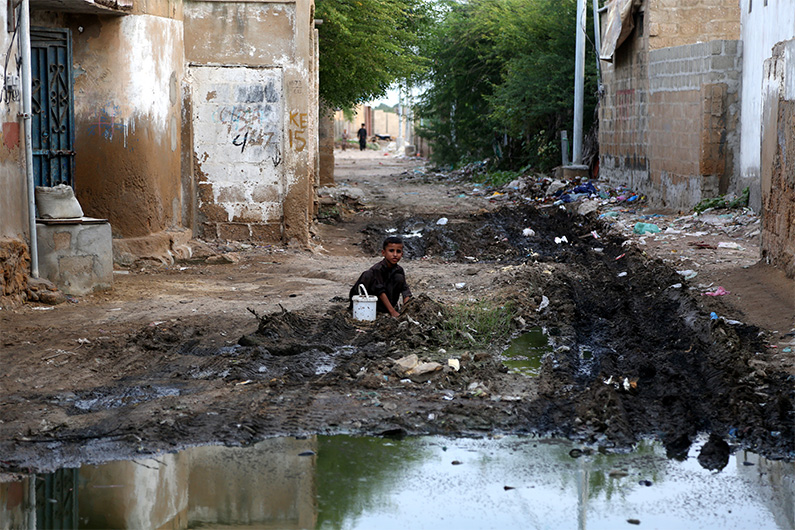
Child collects waste from wet soil absorbed with contaminated water in Rehri Goth, Karachi, September 2, 2022 (AN Photo/S.A. Babar)
She said climate change had caused sea levels to rise and affected livelihoods in a major way.
“When earning from the sea was good, it led to better income opportunities for women too — they used to make pickles and sell other food items,” she said. “However, now several factors such as sea pollution, cutting of mangroves and overfishing have contributed to lack of employment opportunities associated with fishing.”
Women prefer working at factories that pay them better than what they get for their independent efforts, Majeed explained. She said some work at flats and homes while a few young women also work with NGOs.
Hamida Siddiqui, another 65-year-old resident of Rehri Goth, holds up a small plastic bag containing no more than three potatoes and an equal number of onions.
“With the rising inflation and major decrease in earnings from the sea, life has become quite difficult for us,” she tells Arab News. “We can’t even afford to buy vegetables.”


